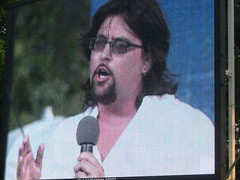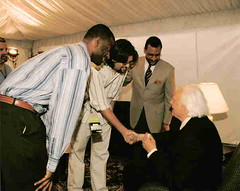Where "Emerging Church" and "Youth Ministry" intersect
The academics are helping make sense of an ongoing conversation about how the Church could more effectively do church (i.e. be "salt" and "light" within the culture, Matt. 5:13-16, as we "disciple nations," Matt. 28:16-20) in the 21st century. Fuller Seminary Professor Kara Powell recently interviewed Professor Ryan Bolger (co-author with Dr. Eddie Gibbs of Emerging Churches) on the intersection of emerging church practices and youth ministry. On youth ministry pioneers shaping emerging church expressions:
"What many leaders and youth workers don’t realize is that most of the leaders in emerging churches came out of youth ministry. A typical scenario we found again and again is that someone who spent eight or ten years as a youth minister in their 20’s wanted to start something on their own, and that something ended up being an emerging ministry. Sometimes they have had a very positive relationship with the church as a youth worker and are looking to do the same sort of ministry beyond just teenagers. They want to take the very best they experienced in youth ministry, like hospitality to others and creative ministry expressions, and extend that to a congregational life. Other times, they were fairly disillusioned with the church and were looking to do something different."On the definition of an emerging church:
"An emerging church is a community that focuses on three core practices: identifying with the life of Jesus, transforming secular space, and living as community. These three core practices tend to be expressed in six other values: welcoming the stranger, serving with generosity, participating as producers, creating as created beings, leading as a body, and taking part in spiritual activities."On "intergenerational" communities:
"At the top of that list would be a value of intergenerational life and ministry as opposed to the fragmentation or separation of ministries into various age groups.... Keep in mind that in a community of 30-40 people, there are probably only 5-8 teenagers. We found many churches had established small groups just for those teenagers. But what separated the churches we studied from other more typical ways of doing church is that “church” is still very much with grandma and grandpa.... "Typically, the community shares responsibility for their youth. Hopefully, there are a handful of adults who feel a special calling or burden to mentor and support those kids. But we’ve had such dramatic cultural changes that in order for older people to understand younger people, they need to learn cross-cultural ministry principles and skills."On the role of "youth pastor":
"So in these churches there is generally no 'youth pastor' who focuses on just teenagers. ... We’ve found that ALL pastoral roles are being re-assessed in emerging churches – not just youth pastors. The roles of senior pastors, worship leaders, and children’s pastors are all being questioned. Instead of a church having set assumptions about who should be 'hired' and 'what' they should do, it’s up to the community to determine what we need and what we’re going to do, and whether or not the niche role of a 'youth pastor' fits into that plan.
On developing effective youth leadership:
Complete interview here."Some of the churches we observed weren’t doing much to develop kids’ leadership. In those that were more effective, a key shift was to replace the idea that we need to do ministry 'for' kids with the idea that we do ministry 'with' them. The way to do ministry 'with' kids was generally to spend time listening to them before trying to 'develop' anything....
After these leaders spend enough time listening, then they seemed to be in a better position to come alongside kids and facilitate students’ creative ministry expressions not from 'above,' but from 'below.' Especially in the U.K., we saw examples of teenagers and 20-somethings who were really functioning as youth pastors themselves. The adult mentors were more responsible for the discipleship of the different adult and student leaders, but the kids were responsible for the content of the actual meetings."













2 Comments:
Wow. Really relevant. I liked the part about thinking/operating as a youth minister. It was cool that it's portrayed as a way of thinking.
Interesting!
I just have one humble question... Is this about the "emergent" church? Because a fine distinction need to be made between emerging and emergent churches (Of example, Mark Driscoll's ministry is emerging, but not emergent).
In my humbly deduced results after study, the emergent church seems to be a serious tangent from biblical Christianity. With novel ways of viewing theology, and denying the orthodoxy of absolute truth of the Bible, the emergent church has compromised the power of the gospel for being attractive to today's culture.
I certainly hope this is not an emergent church motivated post! For more to learn, I would humbly advice looking into Driscoll's ministry. Their "reformission" inspires me, as an aspiring youth pastor, as to how to remain culturally relevant, without giving up humble orthodoxy in the truth of the Bible.
I hope to hear your thoughts about my not-so-eloquent perspective. :) You're welcome to post on my blog!
God bless you, Jeremy!
Because of the cross,
Roshan
Post a Comment
<< Home